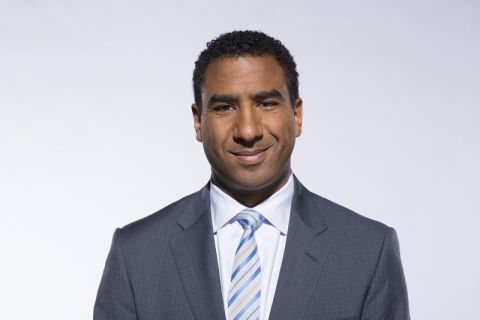
Focus helped lawyer and former CFL player Jock Climie, Law’94 (Artsci’89), earn this year’s J.A. (Alec) Corry Distinguished Alumni Award for excelling in a career outside the traditional practice of law. “Any success I’ve had in my life is due entirely to my ability to focus on the thing that’s right in front of me,” Climie says.
It is that focus, combined with some techniques for efficiency, that has allowed the former All-Star football player and partner at Emond Harnden in Ottawa to balance being a lawyer, a professional athlete, a father, and a broadcaster – and create two successful careers in two things that he loves: football and law.
Growing up in a military family, he moved wherever his father was posted, often every two to three years, living in Europe for numerous years. He completed his undergraduate degree at Queen’s in economics. During an industrial relations course in the third year of his undergrad, he participated in a moot arbitration where he researched, prepared, and delivered submissions. He was told by the law student running the moot that he had a natural ability for the work – and Climie agreed. “I felt like that was exactly what I should be doing, so I signed up for my LSAT the next day and the rest is history,” he recalls.
While he thought that he wanted to focus on criminal law – he won the Advanced Criminal Law Prize at Queen’s Law and articled as a criminal prosecutor for Justice Canada, but then a stint in labour law during his articles changed his perspective. Believing in the importance of efficient and profitable organizations as essential to the smooth functioning of the economy, he felt that labour law was something that he could “buy into philosophically.” In addition, he says that he could do more to help employees in need by representing their employers. “I’ve always said that I can do more for an employee on the employer’s side than the employee’s lawyer could ever do, because I’m the one advising the employer and if I think the employer is treating somebody badly or being unfair to somebody – with a word I can get them to change their mind,” he says.
Climie has never had much time for philosophy though. In his first year of law school and fourth year with the Queen’s Golden Gaels, he was drafted into the CFL (while playing for Queen’s, he was inducted into the Queen’s Football Hall of Fame). Climie insists that building two careers simultaneously was not as hard as people think. “Yes, I did both at the same time and in the same year, but never in the same moment,” he says. Climie would focus on football for five months, then focus on four months of law school in the winter. His scheduled continued like that, alternating five months of football, with seven months of articling and then working as a lawyer. In his 12-year career, Climie played for the Toronto Argonauts, Ottawa Rough Riders, and Montreal Alouettes. He was named a CFL East All-Star three times: in 1993 while playing for Ottawa and in 1996 and 1997 while playing for Montreal. Only once did football and law converge, in 1998 when he wrote his bar exam in Ottawa while also playing football in Montreal. “That was the most challenging thing I’ve ever done in my life,” he says. “Everything else was great because I got to do one and completely switch gears and do something else that I love.”
After he retired from professional football, Climie continued to build his management-side labour and employment practice at Emond Harnden while staying involved with the CFL as an on-air analyst for TSN for 17 years. The challenge of live television helped him avoid missing football but flying to Toronto every weekend while managing a law career and three young kids required some skillful broadcast preparation. Climie says he didn’t have time to put in 20 hours of research like other broadcasters did. So, he focused on what was in front of him. Arriving at the studio a few hours before the game, he would “leave the law behind” and prep. He also made notes during games which he could use the next time he saw that same team play. “Using those techniques, I was able to roll into a broadcast and look like I’d done nothing but think about football all week, when in fact I hadn’t,” he says.
Now, two years after his retirement from TSN, Climie is focusing again – but this time, on slowing down. He says he’s adjusting to focusing more on his health and his kids and friends after doing a combination of football and law for 30 years. “It’s about being well-rounded. I don’t believe that every person coming out of law school should go on to be the greatest lawyer in the world and not be great at anything else,” he says.
And it was his time at university that showed Climie the focus necessary to be great at more than one thing. “Playing university football while attending law school taught me about balance, discipline, and how to succeed in more than one thing,” he says. As for being recognized by his alma mater for succeeding in a non-traditional career, “It’s quite an honour.”
By Geena Mortfield